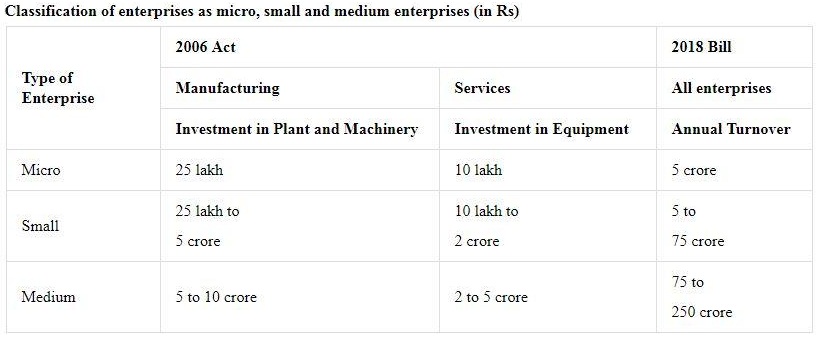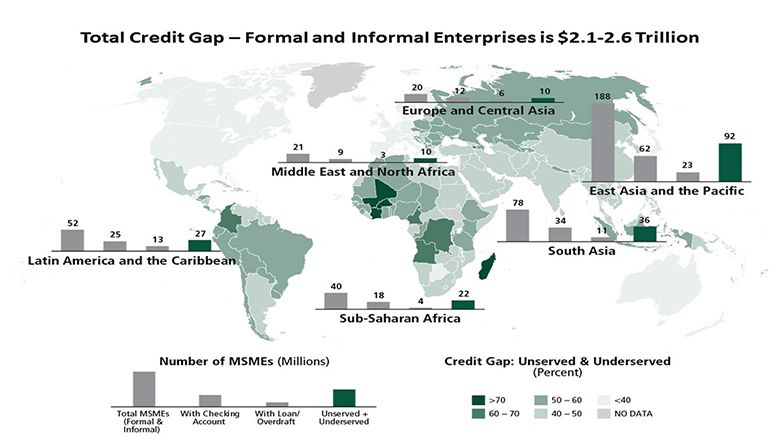Indian Economy
Micro, Small and Medium Enterprises (MSME)
- 17 Jul 2019
- 13 min read
Introduction
- Worldwide, MSMEs have been accepted as the engine of economic growth and for promoting equitable development.
- They constitute over 90% of total enterprises in most of the economies and are credited with generating the highest rates of employment growth.
- With low investment requirements, operational flexibility and the capacity to develop appropriate indigenous technology, SMEs have the power to propel India to new heights.
- Hence, it seems like there is a silent revolution happening in India powered by MSMEs.
Importance of MSMEs for Indian Economy
- Employment: It is the second largest employment generating sector after agriculture. It provides employment to around 120 million persons in India.
- Contribution to GDP: With around 36.1 million units throughout the geographical expanse of the country, MSMEs contribute around 6.11% of the manufacturing GDP and 24.63% of the GDP from service activities.
- MSME ministry has set a target to up its contribution to GDP to 50% by 2025 as India becomes a $5 trillion economy.
- Exports: It contributes around 45% of the overall exports from India.
- Inclusive growth: MSMEs promote inclusive growth by providing employment opportunities in rural areas especially to people belonging to weaker sections of the society.
- For example: Khadi and Village industries require low per capita investment and employs a large number of women in rural areas.
- Financial inclusion: Small industries and retail businesses in tier-II and tier-III cities create opportunities for people to use banking services and products.
- Promote innovation: It provides opportunity for budding entrepreneurs to build creative products boosting business competition and fuels growth.
Thus, Indian MSME sector is the backbone of the national economic structure and acts as a bulwark for Indian economy, providing resilience to ward off global economic shocks and adversities.
MSME redefined
- The Micro, Small and Medium Enterprises Development (Amendment) Bill, 2018 proposes to reclassify all MSMEs, whether they are manufacturing or service-providing enterprises, on the basis of their annual turnover.
- The bill was introduced in the Lok Sabha and further referred to the Standing Committee which tabled its report on 28 December 2018.
Benefits of proposed reclassification
- The new classification would eliminate the need for frequent inspections which was earlier required to check the investment in plant and machinery.
- It would be a non discriminatory, transparent and objective criterion.
Factors which led to growth of MSMEs
- Campaigns like Skill India, Startup India, Digital India and Make in India aim to provide MSME players with a level playing field and a definitive push towards enhanced productivity.
- Digitization: Increasing internet penetration, customer’s familiarization with digital payments fuelled by B2C ecommerce players facilitate MSME sector growth.
- Tie-ups with new-age non-banking finance (FinTech) companies allowed access to timely collateral free finance to MSMEs.
- Changing employment patterns: Younger generation shifting from agriculture towards entrepreneurial activities creating job prospects for others.
Issues faced by MSMEs and steps taken to improve their condition
| Issues and Challenges | Steps Taken |
|
Access to credit
|
|
|
Access to Markets
|
|
|
Technology Access
|
|
|
Quality and Export Issues
|
|
|
Ease of Doing Business
|
|
Government schemes to promote MSMEs
- Udyami Mitra Portal : launched by SIDBI to improve accessibility of credit and handholding services to MSMEs.
- MSME Sambandh : To monitor the implementation of the public procurement from MSMEs by Central Public Sector Enterprises.
- MSME Samadhaan -MSME Delayed Payment Portal –– will empower Micro and Small entrepreneurs across the country to directly register their cases relating to delayed payments by Central Ministries/Departments/CPSEs/State Governments.
- Digital MSME Scheme : It involves usage of Cloud Computing where MSMEs use the internet to access common as well as tailor-made IT infrastructure
- Prime Minister Employment Generation Programme : It is a credit linked subsidy program under Ministry of MSME.
- Revamped Scheme of Fund for Regeneration Of Traditional Industries (SFURTI) : organizes traditional industries and artisans into clusters and make them competitive by enhancing their marketability & equipping them with improved skills.
- A Scheme for Promoting Innovation, Rural Industry & Entrepreneurship (ASPIRE) : creates new jobs & reduce unemployment, promotes entrepreneurship culture, facilitates innovative business solution etc.
- National Manufacturing Competitiveness Programme (NMCP) : to develop global competitiveness among Indian MSMEs by improving their processes, designs, technology and market access.
- Micro & Small Enterprises Cluster Development Programme (MSE-CDP) - adopts cluster development approach for enhancing the productivity and competitiveness as well as capacity building of MSEs.
- Credit Linked Capital Subsidy Scheme (CLCSS) is operational for upgradation of technology for MSMEs.
Other recent initiatives to promote MSMEs
- In June 2019, RBI committee headed by former SEBI Chairman UK Sinha suggested a Rs 5,000 crore stressed asset fund for the MSME sector to provide relief to small businesses hurt by demonetisation, GST, and an ongoing liquidity crisis.
- It has also recommended doubling the cap on collateral-free loans to Rs 20 lakh from the current Rs 10 lakh extended to borrowers falling under the Mudra scheme, self-help groups, and MSMEs.
- MSME Ministry announced in June 2019 to lift the ban on entry of corporates and private players in the MSME sector to pave way for the formation of 700 clusters to reduce dependence on imports as well as for job creation.
- MSME Ministry is also planning to set up enterprise facilitation centres across the country to make smaller businesses more competitive and help them integrate with big enterprises.
Therefore, the government should continue to put concerted efforts for holistic development of MSMEs in key areas like human capacity development, knowledge services, access to finance, technology, infrastructure, market access, and ease of doing business.
International Experiences
- According to World Bank, formal SMEs contribute up to 60% of total employment and up to 40% of national income (GDP) in emerging economies.
- 600 million jobs will be needed in the next 15 years to absorb the growing global workforce, mainly in Asia and Sub-Saharan Africa. In emerging markets, most formal jobs are generated by SMEs, which also create 4 out of 5 new positions.
- However, access to credit remains a major problem to the MSME sector globally.
In globalised world, it is imperative to enable MSMEs to adapt and thrive in a more open environment and participate more actively in the digital transformation, to boost economic growth and deliver a more inclusive globalisation.
Way Forward
- Today enterprises need to adopt best practises and follow international standards to go forward for offering innovative solutions.
- Focus should be on transfer of information and skill development to effectively use the transferred technology.
- There is an urgent need to upgrade infrastructure utilities (like water, power supply, road/rail) for any enterprise to run its operations successfully.
- Entrepreneurs need to develop quality conscious mindsets embedded in the organisational culture.
- Sensitisation and handholding of MSMEs at different and upgraded level of certification is the need of the hour.
Finally, as recommended by India MSME Report 2018, we need an entitlement approach that can have the potential of compelling all related stakeholders to work on a common national agenda and solutions under a scientifically structured framework. This approach demands the identification and analysis of major security threats to the MSMEs, and entrepreneurship at the grass root level.






